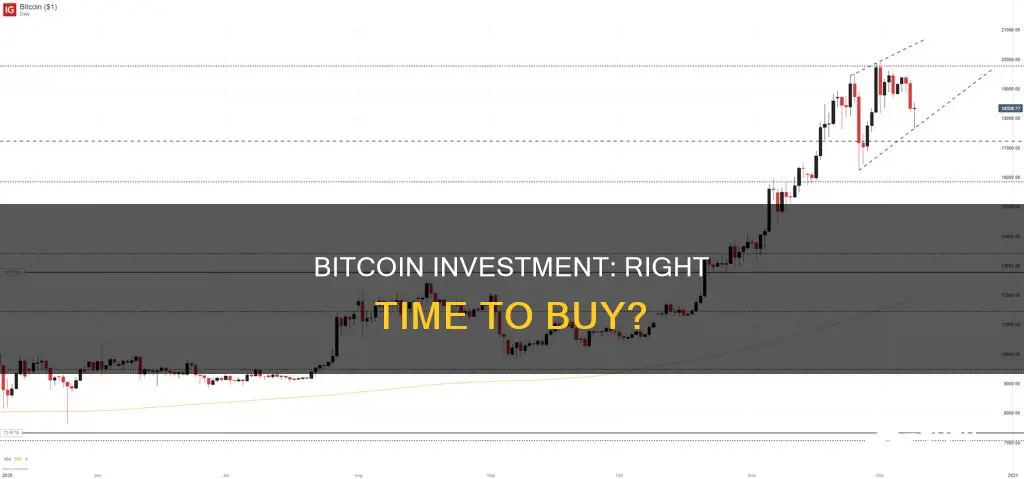
Bitcoin is prone to price volatility, with wide swings to the upside and downside. The most recent upswing comes alongside growing institutional demand for the cryptocurrency as an attractive asset class. Bitcoin's value has rallied over the last few quarters, increasing from about $26,000 in mid-September 2023 to an all-time high of around $73,000 in mid-March 2024.
Since the Bitcoin halving, the price has fluctuated within a wide margin, ranging from $55,000 to $71,000. On May 20 and June 5, the price briefly came within range of its previous high, reflective of the cryptocurrency market's volatility.
Bitcoin's value is influenced by five factors: supply and demand, media coverage, public interest, government legislation, and the performance of the wider crypto market.
Bitcoin is a fascinating asset. Simultaneously a transactional tool and a speculative commodity, it's attracted the attention of investors almost since it first hit the market. Unfortunately, it's also incredibly volatile.
For that reason, while current market conditions are favourable for anyone considering buying Bitcoin, it is an asset you should purchase only at your own risk. Because while Bitcoin may have the potential for significant returns, you may also lose most of your investment.
| Characteristics | Values |
|---|---|
| Price Volatility | Prone to wide swings to the upside and downside |
| Recent Price Performance | Rallied from about $26,000 in mid-September 2023 to an all-time high of around $73,000 in mid-March 2024 |
| Supply and Demand | No more than 21 million Bitcoins can be produced, and this is unlikely to happen before 2140 |
| Investment Outlook | Experts are divided, some believe it is a good time to buy, others believe it is best to wait |
| Risk | High-risk asset |
What You'll Learn

Bitcoin's value and volatility
Bitcoins Value and Volatility
Bitcoin's value is influenced by five factors: supply and demand, investor actions, public interest and media coverage, government legislation, and the actions of big financial players.
Supply and Demand
Bitcoin's price is influenced by how many coins are in circulation and how much people are willing to pay. Bitcoin is limited to 21 million coins, and as the circulating supply gets closer to this limit, prices are likely to climb. In addition, Bitcoin's demand is increasing in countries experiencing currency devaluation and high inflation.
Investor Actions
Bitcoin's volatility is also driven by investors. Large investors with holdings significant enough to influence market value are known as "whales." If these whales were to suddenly sell their Bitcoin holdings, prices would plummet as other investors panicked.
Public Interest and Media Coverage
As a speculative commodity, Bitcoin is heavily influenced by public opinion and media coverage. For example, in 2021, a tweet from Elon Musk caused Bitcoin's price to drop by 30% in a single day.
Government Legislation
Bitcoin is also influenced by government legislation. For example, China's 2021 ban on cryptocurrency caused a sharp price drop. A ban in other major regions, such as the European Union or the US, could be devastating for Bitcoin's overall value.
Big Financial Players
Finally, big financial players can also influence Bitcoin's value. For example, in 2023, investors' expectations of exchange-traded product (ETP) approvals drove Bitcoin's price from about $27,000 to more than $43,000.
Volatility
Bitcoin is considered a volatile asset, and its price can fluctuate dramatically over short periods. This volatility is the price Bitcoin investors pay for its limited supply and lack of a central bank to control that supply. Bitcoin is still a nascent asset class and is in the price discovery phase, which is the most volatile part of any asset's life cycle.
Volatility means that an asset is risky to hold, as its value may go up or down substantially. Bitcoin's volatility can be influenced by various factors, including news and media coverage, investor sentiment, government regulations, and economic conditions.
While Bitcoin has recovered from previous falls, there is no guarantee that its value will continue to climb. It is important to remember that Bitcoin is a high-risk asset, and investors should only purchase it at their own risk.
Amazon Bitcoin: A Guide to Investing
You may want to see also

Supply and demand
Bitcoin's price is influenced by supply and demand. When there is more demand for Bitcoin, the price goes up, and when there is less demand, the price goes down.
Bitcoin has a maximum supply of 21 million coins, and this limited supply is one of the factors driving its price. Bitcoin's supply is dwindling over time, with a finite number of coins projected to be mined by 2140. This decreasing supply coupled with a surge in demand has fuelled a rise in Bitcoin's price.
Demand for Bitcoin has been increasing, driven by media coverage, investing "experts", and business owners touting its value. Bitcoin has also become popular in countries with high inflation and devalued currencies, such as Venezuela. Additionally, it is in demand for transferring large sums of money for illicit and illegal activities.
The price of Bitcoin is also influenced by the availability of competing cryptocurrencies. Ethereum, for example, has emerged as a formidable competitor, with investors seeing its potential in reinventing modern financial infrastructure. In 2017, Bitcoin accounted for over 80% of the overall market capitalization in cryptocurrency markets, but by 2024, that share had dropped to less than 55%.
Bitcoin's price is also impacted by regulatory changes. For example, China's ban on Bitcoin trading and transactions in 2021 affected its supply and demand, causing prices to fall. However, they quickly regained and surpassed previous levels as mining operations moved to other countries.
The Ultimate Guide: Investing Bitcoin in South Africa
You may want to see also

Bitcoin's market share
Bitcoin remains the dominant force in the cryptocurrency market and is the marker by which many other cryptocurrencies determine their value. However, there is no guarantee that this will always remain the case. There are now several Bitcoin alternatives, known collectively as altcoins. The most significant of these is Ethereum, which currently accounts for roughly 14% of the crypto market.
Bitcoin's value is influenced by five factors: supply and demand, the cost of production, government legislation, public interest and media coverage, and competition.
Bitcoin is prone to price volatility, with wide swings to the upside and downside. It is far more volatile than the overall stock market, which can be exciting when the price is on a tear but can also result in significant losses when times are bad.
When considering investing in Bitcoin, it is important to remember that it is a high-risk and speculative asset. It is best suited for investors with an already diversified portfolio who are willing to take on additional risk in the hopes of high returns.
Gladiacoin: Principal Returns and Profits
You may want to see also

Government legislation
The regulatory landscape for Bitcoin and other cryptocurrencies is complex and varies across jurisdictions. While some countries have embraced the technology, others have taken a more cautious or restrictive approach. Here's an overview of the government legislation related to Bitcoin:
United States
The US government has largely refrained from directly regulating cryptocurrencies, leaving it to individual states to determine how their citizens can participate. The only concrete federal guidelines concern the reporting and taxation of cryptocurrency profits. However, the Securities and Exchange Commission (SEC) and the Commodity Futures Trading Commission (CFTC) have been active in regulating the sector, with the SEC taking legal action against crypto-centric businesses.
Europe
Europe has taken a more proactive approach to cryptocurrency regulation, with the European Union (EU) being the first to adopt measures against illicit cryptocurrency uses. The EU's Markets in Crypto-Assets (MiCA) regulation defines and governs how cryptocurrency should be regulated within the bloc. Switzerland, a non-EU member, has also embraced a non-regulatory approach, fostering a booming blockchain startup scene.
Asia
Asian countries have a diverse range of stances on Bitcoin and cryptocurrencies. Japan is one of the most cryptocurrency-positive countries, recognizing them as a legal means of payment. In contrast, China imposed strict regulations on crypto trading and mining in 2021, and other Asian countries like Bangladesh, Nepal, and Kyrgyzstan have banned their use altogether.
Australia
Australia has struck a balance between fostering blockchain technology and regulating speculative cryptocurrencies. It has labeled Bitcoin as "money" for taxation purposes and has built boundaries to guide initial coin offerings (ICOs).
India
India remains undecided about crypto regulation, with a bill prohibiting private cryptocurrencies yet to be voted on. A 30% tax is levied on crypto investments, and a 1% tax deduction at the source is applied to crypto trades.
Brazil
Brazil passed a law in 2022 legalizing cryptocurrencies as payment methods, with the Brazilian Central Bank designated as the competent authority to regulate and supervise crypto exchanges.
United Kingdom
The UK recognized crypto assets as regulated financial instruments in 2022, and the Financial Services and Markets Act of 2023 extended existing laws to cover all crypto assets, services, and providers. Crypto derivatives trading is banned, and exchanges must comply with anti-money laundering and counter-terrorism financing obligations.
Canada
Canada was the first country to approve a Bitcoin exchange-traded fund (ETF), and it requires crypto trading platforms and dealers to register with provincial regulators. Cryptocurrency is taxed similarly to other commodities, and all crypto investment firms are classified as money service businesses (MSBs).
Canadian Coin Collection: Worthy Investment or Waste of Money?
You may want to see also

Public interest and media coverage
More recently, in January 2024, a hacker falsely stated on Twitter that the US Securities and Exchange Commission (SEC) had approved all eight pending Bitcoin exchange-traded funds (ETFs). This caused the price of Bitcoin to spike to $48,000, but it quickly dropped back down to around $46,000 after the SEC confirmed the hack.
The approval of the first US spot Bitcoin ETFs in January 2024 also attracted media attention and contributed to the growing institutional demand for Bitcoin as an attractive asset class. The launch of these ETFs made it easier for traditional investors to gain exposure to Bitcoin, and similar funds are expected to emerge, including portfolios that combine Bitcoin exposure with mainstream investments.
Chainlink Investment: Wise Choice or Risky Business?
You may want to see also
Frequently asked questions
It's impossible to say for sure, but there are a few things to consider. Bitcoin is prone to price volatility, so while it could be a good time to buy, there's also a chance that the value will drop. It's important to remember that Bitcoin is a high-risk, speculative investment. If you do choose to invest, make sure you understand the risks involved and only invest money you can afford to lose.
Bitcoin's value is influenced by a few key factors, including supply and demand, media coverage and public interest, and government legislation. For example, China's ban on Bitcoin in 2021 caused a sharp drop in its price.
Bitcoin is a very volatile and speculative investment, which means there's a high risk of losing money. It's also important to consider the broader crypto market and the potential impact of things like cybercrime and government regulation.
If you choose to invest in Bitcoin, it's important to start small and only invest what you can afford to lose. It's also crucial to do your research and understand the technology behind cryptocurrencies before investing. Prioritizing cybersecurity and ignoring the hype are also key.







